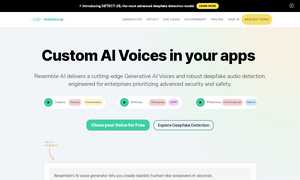
Explore powerful tools for efficient work habits.
Find the Best AI Tools to Optimize Your Work and Personal Tasks
Best Speech & Voice AI Tools in 2024


What is Speech & Voice
The Speech & Voice Category showcases innovative AI tools designed to enhance and streamline voice recognition, speech synthesis, and language processing. These systems empower users with high accuracy and efficiency for applications in accessibility, customer service, and entertainment. Discover the transformative potential of voice technology today!
How Speech & Voice works
The Speech & Voice Category operates by employing sophisticated algorithms and machine learning models to analyze and interpret spoken language. Users interact with these systems through voice commands or speech input, which the technology processes in real time to deliver outputs like text transcription or voice responses. Key steps include capturing audio via microphones, processing the signals for clarity, and using predefined linguistic models to understand context and intent. Best practices for utilizing these tools emphasize clear enunciation and appropriate use case application, ensuring users achieve optimal results from the Speech & Voice technology.
What are the advantages of Speech & Voice?
The advantages of the Speech & Voice Category lie in its ability to significantly enhance efficiency in communication. With high accuracy in speech recognition and natural language processing, users can automate response systems, improving customer interactions and operational workflow. Unique features like multilingual support and continuous learning allow for adaptability in diverse environments, thus adding tremendous value. The technology not only saves time but also enhances accessibility, making it indispensable for various industries seeking innovative solutions in voice technology.
Key Features for Speech & Voice
Real-time Speech Recognition
Real-time Speech Recognition is a standout feature of the Speech & Voice Category, enabling immediate conversion of spoken language into text. This unique capability enhances applications like virtual assistants and transcription services, allowing for seamless communication and quick information retrieval that benefits users in various scenarios.
Natural Language Processing
Natural Language Processing enhances the Speech & Voice Category by enabling systems to understand, interpret, and generate human language naturally. This capability allows for more intuitive user interactions within applications like customer service chatbots, providing personalized responses that meet user needs effectively.
Multilingual Support
Multilingual Support within the Speech & Voice Category allows users to interact in multiple languages, breaking communication barriers. This feature caters to global audiences, making applications more accessible and fostering inclusive experiences for users across diverse linguistic backgrounds.
Use Cases for Speech & Voice?
Common use cases for the Speech & Voice Category include virtual assistants, customer support chatbots, transcription services, and accessibility tools for individuals with disabilities. Businesses leverage voice interfaces for hands-free operations, improving user experience while addressing specific needs, such as real-time language translation or enhancing engagement through voice-activated applications. These scenarios highlight the technology’s problem-solving capabilities, making it an essential resource in modern communication strategies.
FAQs for Speech & Voice
What key benefits does the Speech & Voice Category provide for businesses?
The Speech & Voice Category offers businesses significant benefits, including enhanced customer engagement and streamlined operations. By leveraging AI-driven voice technology, organizations can automate responses, improve accessibility for users with disabilities, and provide real-time assistance, ultimately leading to increased efficiency and satisfaction in customer interactions.
How does Natural Language Processing enhance the Speech & Voice experience?
Natural Language Processing enhances the Speech & Voice experience by enabling systems to process and understand human language naturally. This feature allows for more effective communication between users and AI, resulting in better context comprehension, personalized interactions, and improved overall user satisfaction across applications in various sectors.
In what ways can the Speech & Voice Category improve accessibility?
The Speech & Voice Category improves accessibility by providing voice-activated technology that assists individuals with disabilities. By enabling hands-free navigation and communication, these tools help users interact with devices more easily, enhancing their ability to access information and engage in everyday activities, ultimately promoting inclusivity.
What sets the Speech & Voice Category apart from other AI solutions?
The Speech & Voice Category stands out due to its specialized focus on voice technology, including unmatched accuracy in speech recognition and natural language processing. These distinctive features not only enhance user interactions with AI but also provide critical solutions for industries needing efficient communication systems tailored to their unique requirements.
What specific applications benefit from Speech & Voice technology?
Specific applications that benefit from Speech & Voice technology include virtual assistants, automated customer service systems, and transcription services. These applications leverage advanced voice recognition and language processing to enhance user interactions, streamline workflows, and provide quick, accurate responses, ultimately addressing various communication needs effectively.
How do users interact with Speech & Voice technology effectively?
Users can interact effectively with Speech & Voice technology by clearly articulating their requests and utilizing the system's features to streamline communication. By following best practices, such as speaking at a moderate pace and using specific commands, users can maximize the benefits of the technology, ensuring accurate recognition and a satisfying experience.











